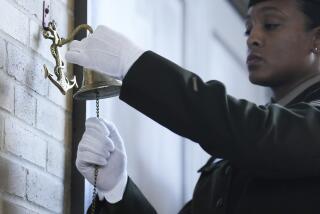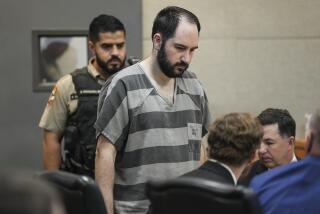Town rallies behind convicted soldier
- Share via
CHICAGO — When Sgt. Michael Leahy Jr. was convicted of premeditated murder in the execution-style slaying of four Iraqis and sentenced to life in prison, his mother went numb. But not for long.
Leahy’s family, friends, former high school classmates and fellow soldiers mounted a counterstrike for leniency. They wrote letter after letter to the top Army official reviewing the case, attesting to his sterling character and good heart.
Those qualities, they believed, should outweigh whatever happened in combat -- which prosecutors ranked among the most heinous crimes by U.S. troops against Iraqi civilians.
“None of us really know what these soldiers face when they are over there, the stress and strain they are under,” said Debbie Leahy, of Downers Grove, Ill. “I am not embarrassed by what my son did. He did what he believed he had to do to survive.”
In March 2007, Leahy and his Army unit were driving toward a remote village west of Baghdad when they came under fire. They couldn’t tell where the shots came from, but they spotted four men and gave chase. Soldiers caught up with them at a nearby house and found weapons there.
Some soldiers wanted to take the Iraqis back to base, but others feared they wouldn’t have enough evidence to hold them. Weeks earlier, two soldiers in their unit had been killed by militiamen.
Soldiers blindfolded the Iraqis, tied their hands behind their backs and took them to a remote canal on the outskirts of Baghdad, Leahy would say later. Then, according to a transcript of the soldiers’ trial, they lined up the detainees, shot them in the back of the head and let their bodies fall into the canal.
“After I fired my weapon, the detainee that I shot fell back on me,” Leahy testified.
“I saw the detainee to the right of me flinch and turn after he heard the shot. And my weapon was pointed at him. . . . I then pulled the trigger and it hit him on the left side of his face, from the ear forward. . . . The second detainee I shot fell to the ground and he was making a gurgling, moaning noise.”
One of Leahy’s superiors finished off the man with a shot to the chest, military prosecutors told jurors. Soldiers testified that one officer said the killings were in retaliation for the deaths of the two soldiers from their unit.
Capt. Derrick Grace argued that the soldiers knew they were violating the law. “A case of premeditated murder does not get much clearer than that,” the prosecutor told the nine-member jury.
Leahy, 28, was convicted in February and sentenced to life, with eligibility for parole after 20 years. Four codefendants, including two superiors, also were convicted or pleaded guilty.
Master Sgt. John E. Hatley, 40, of Texas was convicted of premeditated murder and sentenced to life with the possibility of parole. Sgt. 1st Class Joseph P. Mayo, 27, of North Carolina pleaded guilty to the same offense and received 35 years with the possibility of parole. Two other soldiers, convicted of lesser crimes, received lighter sentences. All were from the Army’s 1st Battalion, 18th Infantry Regiment.
To Iraqis, reports of abuse and extrajudicial killings by American soldiers are met with outrage and demands for severe punishment.
But to Leahy’s friends and family in Illinois, his sentence was far too harsh. To them, the incident illustrates how soldiers in the heat of combat can confuse right and wrong.
Leahy, known as “Mickey,” had a typical suburban upbringing, friends and family say. He played football and baseball in high school, graduating in 1999.
By the time he joined the Army in 2003, he had become interested in medicine and thought the military could give him the structure and training to make it a career.
He had planned to transfer to an Army Rangers training school in Georgia and later become a physician’s assistant in Texas, family members said. He was wrapping up his second tour in Iraq at the time of the incident.
Now, he is imprisoned at the U.S. Disciplinary Barracks at Ft. Leavenworth, Kan.
But his friends and family live in hope -- and at least some of their wishes have come true.
Earlier this month, a brigadier general granted Leahy clemency, reducing his sentence to 20 years with parole eligibility after seven, according to Army officials. His discharge was upgraded from “dishonorable” to “bad conduct.”
Leahy could serve even less time if his attorney can persuade the Army Clemency and Parole Board that he suffered from combat stress and fatigue and was following the lead of higher-ranking soldiers against suspected militiamen who had attacked his troops.
Army officials refused to discuss Leahy’s case or explain the latest ruling.
But they said a clemency review is triggered when soldiers are convicted of crimes and sentenced to more than a year in jail.
In considering clemency, Army statutes say, the convening authority looks at the merits and circumstances of the offense, the soldier’s civilian and military history, disciplinary records, and testimonials from family, friends and others wishing to show support.
Officials are considering clemency for all five convicted soldiers from that unit.
But in Downers Grove, news of Leahy’s clemency was bittersweet. Many had believed that his expression of remorse, and what they saw as extenuating circumstances, deserved a full pardon.
Leahy’s wife, Jamie, 27, said the last few months have been difficult.
But now, she said, they talk frequently on the phone and she’s planning a trip to see him once he’s transferred to the general population.
“There’s a certain mind-set you have to have when you’re in a war situation, and I think he did what he thought he had to do,” Jamie Leahy said. “Now when we talk, we’re actually able to talk about the future.”
--
More to Read
Sign up for Essential California
The most important California stories and recommendations in your inbox every morning.
You may occasionally receive promotional content from the Los Angeles Times.










